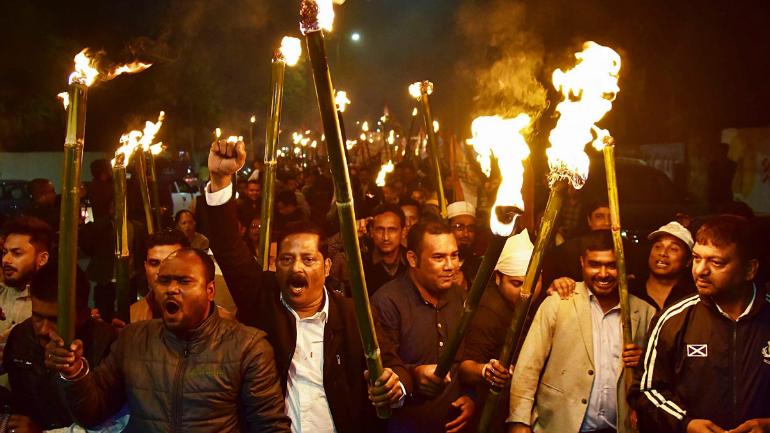Posted by Jobeth Ann Warjri
On the 19thof December 2018, student organizations from Northeast India organised a sit-in at Jantar Mantar, New Delhi. That Wednesday was one in a series of protests that began (at least in Delhi) the previous month on the 19th of November, 2018. What the students wanted was for the government to revoke the contentious Citizenship (Amendment) Bill, 2016 (CAB). The Bill is, at best, the ruling party’s attempt to garner previously unsolicited votes and, at worst, a communal powder keg.
Its antecedents stretch back to the Citizenship Act, 1955 when the Indian Government had defined an illegal immigrant as one who enters the country with forged documents or passport, or one who has overstayed the visa permit. The 2016 amendment of the original Citizenship Act grants citizenship status to religious minorities, namely, Hindus, Christians, Sikhs, Buddhists, Jains, and Parsis from Afghanistan, Pakistan, and Bangladesh.
That the Bill is communally motivated is evident in its recognition of religious affiliation as a qualifier to avail citizenship status, including its total disregard for the Muslim population. In making religion the basis for citizenship, the Bill comes across as fundamentally unconstitutional. Haven’t we, as schoolchildren, recited the Preamble to the constitution which introduced Indian constitutional laws, and therefore India itself, as a socialist, secular republic?
The killing of five Hindu men in Assam’s Tinsukia district on the 1st of November 2018 has been prompted by fears over the passing of the CAB.
Constitutionally, secularism in India means that the state must be neutral and non-interfering where religion and religious practices are concerned. Articles 25-28 which provides for the freedom of religion, therefore, are meant to safeguard the citizens of India from state interference. Article 25(1) of the Indian Constitution states that “Subject to public order, morality and health and other provisions of this Part, all persons are equally entitled to freedom of conscience and the right freely to profess, practise and propagate religion.”
The discriminatory religious cornerstone of the CAB, however, does away with this safeguard by enabling the state to interfere with religious freedoms and to do so legally. Seen from this perspective, the CAB is, and should be, a cause for concern not only for the Northeastern states but for the rest of India as well. Aside from the obvious vote bank politics, the Bill foreshadows the country’s transformation from a secular republic into a theocracy.
Also read: The Assam Registry And India’s Pursuit Of The Hindu Rashtra
The effects of the Bill have already been felt and seen, especially in the Northeast where opposition against it has been most voluble. On the 8th of January 2019, state police in Tripura fired live bullets at protestors wounding six and on the 11th of January 2019, sedition charges were levelled against Axom activists Dr. Hiren Gohain, Akhil Gogoi and Manjit Mahanta for their opposition against the Bill. Not surprisingly, it is Left-wing ideologues that have faced the brunt of state repression. Their anti-religious, critical stance is a foil to the prevailing and overtly religious Hindutva ideology. In Meghalaya, on the 11th of January 2019, a group of fire services personnel from Odisha were assaulted by CAB protestors.
The Bill is a politically opportunistic way of ensuring that the region will always be under the thumb of the federal government.
The last piece of news is the especially worrying. It shows the extent to which communal politics have already been stoked and revived following the passage of the CAB in the Lok Sabha. The killing of five Hindu men in Assam’s Tinsukia district on the 1st of November 2018 has been prompted by fears over the passing of the CAB. The passing of the CAB in the Lok Sabha, therefore, feeds on pre-existing communal tensions. In a region that is already politically sensitive, the passage of the Bill has resulted in fanning xenophobic flames to the extent that anyone suspected of being a ‘Bangladeshi’, or consorting with one, falls in harm’s way. It has given racial purists the ammunition they need to fuel their brand of communal politics.
If the aim of the ruling government is to create political and social unrest in the Northeast, then it is already on its way to doing so. It is a politically opportunistic way of ensuring that the region will always be under the thumb of the federal government. As we have already experienced in the not-too-distant past, it only takes a hint of a spark for the Centre to enforce draconian measures such as the Armed Forces (Special Powers) Act in the region, ostensibly to maintain peace. The question remains as to whether we should resist such manipulations or risk having history repeat itself.
Also read: Why The Citizenship Amendment Bill Is Causing Concern To The North-Eastern States Of India
If my memory serves right, 2002 was a bad year for Gujarat and the rest of the country precisely for the collusion between the state police force and the government in allowing communal riots to go on for as long and as severely as they did. The Northeast is just a microcosm of what could happen elsewhere.
Jobeth Ann Warjrigoes by the pronouns ‘she’ and ‘her’. She formerly taught English as a Guest Faculty at The English and Foreign Languages University, Shillong Campus.
Featured Image Source: India Today
About the author(s)
Guest Writers are writers who occasionally write on FII.





insightful